Papers by Anne Goossensen
SSM - Qualitative Research in Health, Aug 1, 2023
Death Studies, Mar 9, 2023
Journal of social intervention: Theory and Practice, Jun 30, 2022

Nursing Ethics, Nov 22, 2019
Background:More and more adults in their fifties and sixties are confronted with the need to supp... more Background:More and more adults in their fifties and sixties are confronted with the need to support their ageing parents. Although many aspects of filial caregiving have been researched, a well-documented and comprehensive overview of the caregiving experience is lacking.Aim:This study aims for a better understanding of the caregiving experience of adult children by generating an overview of main themes in international research.Method:A literature review of qualitative studies, focusing on the experiences of adult children caring for their ageing parents, was performed. The electronic EBSCO databases Academic Search Premier, CINAHL and PsycINFO, and Google Scholar were searched to identify relevant qualitative studies published between 2000 and 2017. The ‘SPIDER’ eligibility criteria directed the approach. The quality of studies included was screened with the assessment sheet designed by Hawker and colleagues. The experiences reported were analysed and themes were synthesized.Ethical consideration:Ethical requirements were respected in every phase of the research process.Findings:Nineteen qualitative studies met the inclusion criteria. The quality of the relationship with the parent appears to be an important determinant of the children’s caregiving experience. Within this context, three themes were found: caregiving as an emotional rollercoaster, a normatively demanding experience and an opportunity for personal development.Discussion:Children caring for their ageing parents have to deal with a wide range of contradicting and conflicting norms and values. Implications for healthcare professionals and future research have been discussed.Conclusion:Caring for ageing parents is a continuous quest for giving the best possible care and living up to one’s personal values, within the context of the parent’s declining health. Professionals who support filial caregivers should address not only practical responsibilities but also the normative questions and moral considerations caregivers are dealing with.
Journal of Loss & Trauma, Jul 3, 2023
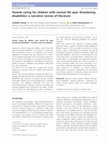
Scandinavian Journal of Caring Sciences, Dec 21, 2018
Parents caring for children with normal life span threatening disabilities: a narrative review of... more Parents caring for children with normal life span threatening disabilities: a narrative review of literature Background: Parents caring for children with normal life span threatening disabilities are exposed to numerous and accumulated stressors. In alignment with current approaches of evidence and value based care, it is essential to integrate knowledge of what encourages parents to hold or recover well-being in care planning and delivery. An omission in knowledge was identified concerning the outline of parents' challenges and ambitions understood from their perspective. Aim: The aim of this study was to explore the insiders perspective of parents caring for children with profound disabilities. Method: The electronic databases CINAHL, PsycINFO, Psychology and Behavioral Sciences Collection and PubMed/ MEDLINE were searched to identify relevant research knowledge (≥2005; peer-reviewed publications in English language). The PRISMA framework was used for structuring literature screening. Criteria for screening and assessing eligibility led to inclusion of 26 studies. Studies were checked for methodological quality according to the critical appraisal tool developed by Hawker. Literature was reviewed following guidelines for narrative synthesis. Results and conclusion: The majority of included studies presented similar, consistent findings though highlighted different aspects of the researched experiences by using specific scopes to understand and interpret the field of knowledge around the meaning of parenting a child with profound disabilities. The process of reviewing led to the overarching theme of keeping balance. Within this overarching theme, six dimensions were elaborated: rediscovering and maintaining family life, delicate inclusion in society, balancing within care triads, integration in service systems, financial consequences and nourishing personal resources to maintain or recover balance. Policymakers, community stakeholders and professional care deliverers should use extracted evidence in order to facilitate debated humanisation of care processes.
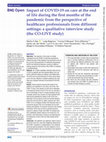
BMJ Open, Mar 1, 2023
Objectives The objective of this study is to better understand how the COVID-19 outbreak impacted... more Objectives The objective of this study is to better understand how the COVID-19 outbreak impacted the different domains of the palliative care approach to end-oflife care from the perspective of healthcare professionals (HCPs) from different professions, working in different settings during the first months of the COVID-19 outbreak in the Netherlands. Methods An in-depth qualitative interview study among 16 HCPs of patients who died between March and July 2020 in different healthcare settings in the Netherlands. The HCPs were recruited through an online survey about end-of-life care. Maximum variation sampling was used. Data were analysed following the principles of thematic analysis. Results Several aspects impacted the quality of the palliative care approach to care at the end of life. First, COVID-19 was a new disease and this led to challenges in the physical domain of end-of-life care, for example, a lack of knowledge on how to manage symptoms and an unreliable clinical view. Second, the high workload HCPs experienced impacted the quality of end-of-life care, especially in the emotional, social and spiritual domains, since they only had time for urgent, physical care. Third, COVID-19 is a contagious disease and measures taken to prevent the spread of the virus hampered care for both patients and relatives. For example, because of the visiting restrictions, HCPs were not able to provide emotional support to relatives. Finally, the COVID-19 outbreak also had a potentially positive impact in the longer term, for example, more awareness of advance care planning and the importance of end-of-life care that includes all the domains. Conclusion The palliative care approach, which is key to good end-of-life care, was often negatively influenced by the COVID-19 pandemic, predominantly in the emotional, social and spiritual domains. This was related to a focus on essential physical care and prevention of the spread of COVID-19.
Verslaving, Jun 1, 2010
ABSTRACT U hebt er vast weleens mee te maken gehad: implementatie, innovatie, zorgvernieuwing of ... more ABSTRACT U hebt er vast weleens mee te maken gehad: implementatie, innovatie, zorgvernieuwing of reorganisatie. Het doorvoeren van vernieuwingen is aan de orde van de dag. Het vergt veel energie en ... leidt helaas in lang niet alle gevallen tot de gewenste uitkomsten (zoals zorg met betere effecten, vanuit een soepeler lopende zorgorganisatie). In een serie bijdragen verken ik theorieën en instrumenten voor vernieuwingsprocessen in de verslavingszorg.
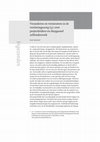
Verslaving, Mar 1, 2009
U hebt er vast wel eens mee te maken gehad: implementatie, innovatie, zorgvernieuwing, reorganisa... more U hebt er vast wel eens mee te maken gehad: implementatie, innovatie, zorgvernieuwing, reorganisatie. Het doorvoeren van vernieuwingen is aan de orde van de dag. Het vergt veel energie en leidt helaas in lang niet alle gevallen tot de gewenste uitkomsten. Op deze plek verken ik theorieën over veranderen en vernieuwen in de verslavingszorg. Ongeveer drie jaar geleden werkte ik mee aan twee pilots 'procesherinrichting'. Het waren complexe trajecten, waarin we met diverse disciplines een zorgproces opnieuw inrichtten. De ene pilot was een groot succes, de andere pilot werd voortijdig afgeblazen en heeft zelfs iemand zijn baan gekost. Eén factor sprong in het oog: de kwaliteit van de twee projectleiders. De ene was een arts die tegen zijn pensioen aan zat. Hij straalde iedere vergadering betrokkenheid uit voor het verandertraject en deed recht aan de verschillende vakperspectieven. Hij vroeg veel van de deelnemers, maar gaf daar ook veel voor terug. De andere projectleider was een ervaren afdelingsmanager. Hij investeerde veel tijd in het zoeken van een team met veranderdeskundigen. Hij maakte tijd vrij voor de vergaderingen, die hij enthousiast voorzat. Al snel bleek echter dat hij toch wat minder integere deals had gesloten. De bedrijfjes van hemzelf en een andere betrokkene voeren er wel bij. Ook had hij moeite om zich open te stellen voor de expertise van de betrokken veranderdeskundigen, omdat hij zich aangevallen voelde op de conceptuele lijn die hij had uitgezet. Een projectleider kan een belangrijk verschil maken bij het slagen van vernieuwingsprojecten. Dat bleek ook op het laatste congres Kennis Beter Delen, begin maart 2008. Daar werd de zaal gevraagd naar belangrijke belemmeringen bij zorginnovatie. Ontbrekend leiderschap werd door 45% van de (honderden) aanwezigen gekozen als belang-* Dr. A. Goossensen is lector verslavingszorg aan de Hogeschool InHolland te Den Haag en senior onderzoeker aan het instituut Beleid en Management Gezondheidszorg van het Erasmus MC te Rotterdam.
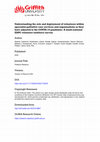
Palliative Medicine, Nov 25, 2022
Background: Early indications were of a major decline in specialist palliative care volunteer num... more Background: Early indications were of a major decline in specialist palliative care volunteer numbers during COVID-19. It is important that ongoing deployment and role of volunteers is understood, given the dependence of many palliative care services on volunteers for quality care provision. Aim: To understand the roles and deployment of volunteers in specialist palliative care services as they have adjusted to the impact of COVID-19. Design: Observational multinational study, using a cross-sectional online survey with closed and free-text option questions. Disseminated via social media, palliative care networks and key collaborators from May to July 2021. Setting/participants: Any specialist palliative care setting in any country, including hospices, day hospices, hospital based or community teams. The person responsible for managing the deployment of volunteers was invited to complete the survey. Results: Valid responses were received from 304 organisations (35 countries, 80.3% Europe). Most cared for adults only (60.9%), provided in-patient care (62.2%) and were non-profit (62.5%). 47.0% had cared for people with COVID-19. 47.7% changed the way they deployed volunteers; the mean number of active volunteers dropped from 203 per organisation to 33, and 70.7% reported a decrease in volunteers in direct patient/family facing roles. There was a shift to younger volunteers. 50.6% said this drop impacted care provision, increasing staff workload and pressure, decreasing patient support, and increasing patient isolation and loneliness. Conclusion: The sustained reduction in volunteer deployment has impacted the provision of specialist palliative care. Urgent consideration must be given to the future of volunteering including virtual modes of delivery, micro-volunteering, and appealing to a younger demographic.
Enhance diversity within LOROS. Increase the knowledge of and respect for the charity within the ... more Enhance diversity within LOROS. Increase the knowledge of and respect for the charity within the community. Creation of 'Volunteer Voice': a support group that has membership from the senior management team and volunteers.

Dementia, Apr 29, 2021
This article aims to gain insight in the normative struggles of adult children caring for their a... more This article aims to gain insight in the normative struggles of adult children caring for their ageing mother living with dementia. Two Dutch autobiographical books written by siblings recording their own caregiving experience were analysed using a narrative design. Children appear to understand their normative concerns through six fields of tension. Our analysis shows that filial caregivers describe two distinct approaches to deal with these normative tensions. One approach aims to preserve the child’s pre-existing personal beliefs and values, but also causes the child to demonstrate rigid and uncompromising behaviour at odds with the needs of their parent. The other approach is more reflective and flexible, prioritizing the needs of the vulnerable person over previously held values, providing an opportunity for better care. We conclude that caregiving children have to find their way between being faithful to their principles and showing moral flexibility.
Palliative Medicine, 2021
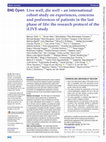
BMJ Open
IntroductionAdequately addressing the needs of patients at the end of life and their relatives is... more IntroductionAdequately addressing the needs of patients at the end of life and their relatives is pivotal in preventing unnecessary suffering and optimising their quality of life. The purpose of the iLIVE study is to contribute to high-quality personalised care at the end of life in different countries and cultures, by investigating the experiences, concerns, preferences and use of care of terminally ill patients and their families.Methods and analysisThe iLIVE study is an international cohort study in which patients with an estimated life expectancy of 6 months or less are followed up until they die. In total, 2200 patients will be included in 11 countries, that is, 200 per country. In addition, one relative per patient is invited to participate. All participants will be asked to fill in a questionnaire, at baseline and after 4 weeks. If a patient dies within 6 months of follow-up, the relative will be asked to fill in a post-bereavement questionnaire. Healthcare use in the last we...
Journal of Intellectual & Developmental Disability
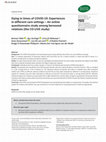
Palliative Medicine, 2022
Background: The COVID-19 pandemic and restricting measures have affected end-of-life care across ... more Background: The COVID-19 pandemic and restricting measures have affected end-of-life care across different settings. Aim: To compare experiences of bereaved relatives with end-of-life care for a family member or friend who died at home, in a hospital, nursing home or hospice during the pandemic. Design: An open observational online survey was developed and disseminated via social media and public fora (March–July 2020). Data were analyzed using descriptive statistics and logistic regression analyses. Participants: Individuals who lost a family member or friend in the Netherlands during the COVID-19 pandemic. Results: The questionnaire was filled out by 393 bereaved relatives who lost a family member or friend at home ( n = 68), in a hospital ( n = 114), nursing home ( n = 176) or hospice ( n = 35). Bereaved relatives of patients who died in a hospital most often evaluated medical care (79%) as sufficient, whereas medical care (54.5%) was least often evaluated as sufficient in nu...
Pallium, 2017
SamenvattingVrijwilligers leveren een belangrijke bijdrage in de zorg voor mensen in de palliatie... more SamenvattingVrijwilligers leveren een belangrijke bijdrage in de zorg voor mensen in de palliatieve fase en hun naasten.1,2,3 Er zijn ruim 11.000 VPTZ-vrijwilligers actief in Nederland.a Veel organisaties in de palliatieve terminale zorg zouden niet kunnen bestaan zonder vrijwilligers. Toch is niet voor iedereen duidelijk wat zij precies doen en wat hun waarde is. Wat is de kern van hun bijdrage en hoe is de kwaliteit ervan te evalueren?
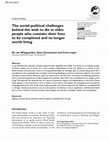
Journal of European Social Policy, 2017
In the Netherlands, physician-assisted dying has been legalized since 2002. Currently, an increas... more In the Netherlands, physician-assisted dying has been legalized since 2002. Currently, an increasing number of Dutch citizens are in favour of a more relaxed interpretation of the law. Based on an ethos of self-determination and autonomy, there is a strong political lobby for the legal right to assisted dying when life is considered to be completed and no longer worth living. Building on previous empirical research, this article provides a critical ethical reflection upon this social issue. In the first part, we discuss the following question: what is the lived experience of older people who consider their lives to be completed and no longer worth living? We describe the reported loss of a sense of autonomy, dignity and independence in the lives of these older people. In the second part, from an ethics of care stance, we analyse the emerging social and political challenges behind the wish to die. Empirically grounded, the authors argue that the debate on ‘completed life in old age’ ...











Uploads
Papers by Anne Goossensen